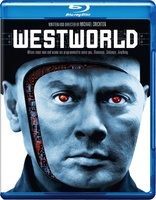Westworld Blu-ray Movie
HomeWestworld Blu-ray Movie 
Warner Bros. | 1973 | 89 min | Rated PG | Mar 05, 2013Movie rating
7.1 | / 10 |
Blu-ray rating
| Users | 3.8 | |
| Reviewer | 3.5 | |
| Overall | 3.5 |
Overview
Westworld (1973)
An amusement park for rich vacationers, the park provides its customers a way to live out their fantasies through the use of robots that provide anything they want. Two of the vacationers choose a wild west adventure. However, after a computer breakdown, they find that they are now being stalked by a rogue robot gun-slinger.
Starring: Yul Brynner, Richard Benjamin, James Brolin, Norman Bartold, Alan OppenheimerDirector: Michael Crichton
| Western | Uncertain |
| Thriller | Uncertain |
| Sci-Fi | Uncertain |
| Action | Uncertain |
Specifications
Video
Video codec: MPEG-4 AVC
Video resolution: 1080p
Aspect ratio: 2.40:1
Original aspect ratio: 2.39:1
Audio
English: DTS-HD Master Audio 5.1 (48kHz, 24-bit)
French: Dolby Digital Mono
German: Dolby Digital Mono
Italian: Dolby Digital Mono
Spanish: Dolby Digital Mono
Spanish: Dolby Digital Mono (Spain)
Subtitles
English SDH, French, German SDH, Italian SDH, Japanese, Spanish, Korean
Discs
25GB Blu-ray Disc
Single disc (1 BD)
Playback
Region free
Review
Rating summary
| Movie | 4.0 | |
| Video | 3.5 | |
| Audio | 3.5 | |
| Extras | 3.0 | |
| Overall | 3.5 |
Westworld Blu-ray Movie Review
Tech Finds a Way
Reviewed by Michael Reuben February 27, 2013As a storyteller, the late Michael Crichton was as prescient as he was popular. A visit to Disneyland's Pirates of the Caribbean inspired Westworld, which Crichton made as his debut film, after he'd first tried to write it as a novel and decided the story would only work visually. The result has become a sci-fi classic, despite its limited budget, dated effects and retro aesthetic. Stories of technology run amuck were nothing new, and the theme has never lost its popularity, as exemplified by such franchises as Battlestar Galactica and the Terminator series (whose central figure owes much to Westworld's implacable Gunslinger). But it was Crichton's inspiration to have the technology of Westworld revolt from performing extraneous leisure functions. In the classic scenario, the rebellious machines perform essential tasks like manning a defense perimeter or controlling a nuclear arsenal, and they decide to take over. In Westworld, the machines play dress-up and make-believe, and they simply decide they've had enough. The brilliance of Crichton's device becomes especially evident when you look at how he recycled it twenty years later in Jurassic Park, another tale of a theme park plagued by malfunction. "If The Pirates of the Caribbean breaks down", says Dr. Ian Malcolm, "the pirates don't eat the tourists." They don't eat them in Westworld either, but other equally unpleasant things happen. Crichton foresaw that technology would be pressed into service to deliver to consumers a kind of ersatz stimulation as daily life became more monotonous, alienated and routine. He wanted to explore—metaphorically, if not literally—the risks of that transition, just as Malcolm warned against the unpredictability of the genetic experiments in Jurassic Park. Being a populist entertainer, he slipped his questions between the lines of a lively, often amusing and always engrossing parody of a theme park for the rich.
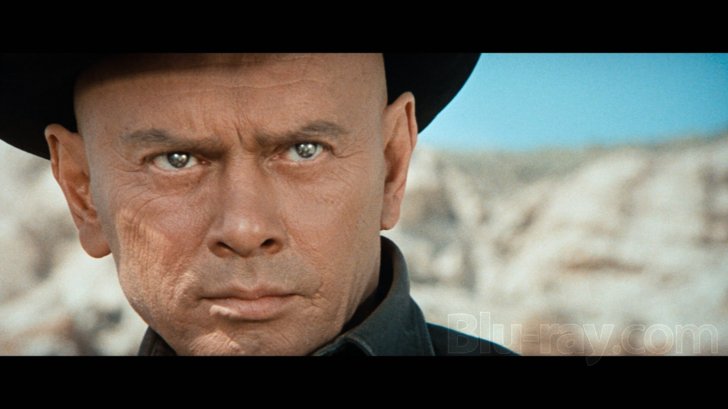
David Koepp, who adapted Crichton's novel of Jurassic Park for the screen, has said that the most common complaint he hears is that "it took too long to get to the island". Crichton wastes no time getting the viewer to Westworld. The film opens with a TV commercial for the theme park, known as "Delos", which Crichton hired a professional ad man to create and is shown in the center of the film's "scope" frame as if it were a television broadcast. Having received an efficient introduction to the three Delos theme parks—Westworld, Roman World and Renaissance World—we're immediately taken to the Delos hovercraft filled with guests rich enough to afford the experience. There we meet our two main protagonists: John Blane (James Brolin), a bachelor returning for a repeat stay, and his friend, Peter Martin (Richard Benjamin), a recently divorced attorney visiting Westworld for the first time and obviously nervous about it. The first half of Westworld could almost be a comedy, as the two vacationing buddies get into the spirit of playing pretend cowboys. As Crichton explains in the EPK-style featurette included in the extras, he chose worlds for the Delos theme park that people know primarily from the movies. This had the practical benefit of allowing him to reuse existing sets, but it also emphasized that Delos deals in pure fantasy. Indeed "Westworld" has the set design and cinematography of a cheesy Hollywood western. Compared to something with a more authentically gritty feel like Deadwood, the Old West of Westworld is positively antiseptic. Its hijinks (the bar fights, bank robberies, shootouts and saloons) are strictly by-the-numbers. Precisely because they're encountering familiar archetypes, Peter and John have a high old time as they move among stock figures straight from central casting, including the cold-eyed gunslinger clad in black. He looks like he just stepped out of The Magnificent Seven, probably because he did. Yul Brynner plays the character in a virtually identical costume to his character Chris Adams in the John Sturges classic. Until the park malfunctions, Brynner pitches his performance slyly on the edge between parody and menace, and it's a delight. (Look, too, for Star Trek's Majel Barrett Roddenberry in the unexpected role of a madam all too eager to send her customers upstairs with "girls" who aren't really girls.) Meanwhile, a small army of technicians, engineers, mechanics and supervisors toils out of sight (mostly underground) to keep the park working at top efficiency. Contemporary eyes may roll at the primitive computer monitors and refrigerator-size computing units, but the real issue is a statistically inexplicable leap in the failure rate for units in the field. The chief supervisor (Alan Oppenheimer) is sufficiently concerned to want to shut down the park and run full diagnostics, but the board of directors disagrees. The board is certain they can protect their guests. Of course they're wrong. Unlike in Jurassic Park, where the system breakdown results from human intervention, in Westworld we never learn what caused the failure. "We don't know exactly how they work", says the chief supervisor, explaining that some of the machines have been designed by other machines. (Sound familiar?) When the failures cascade at an escalating rate, it's every man, woman and robot for him, her or itself. Crichton has a lot of fun with the different capabilities of flesh vs. silicon—Westworld is reportedly the first film where digital technology was applied to process imagery, in this instance to simulate a robot's point of view—but in the end he leaves all the questions unanswered. What was the cause? Who is responsible? What happens now? Crichton liked to challenge viewers, and it's a tribute to his imagination that, forty years later, Westworld is still challenging.
Westworld Blu-ray Movie, Video Quality 
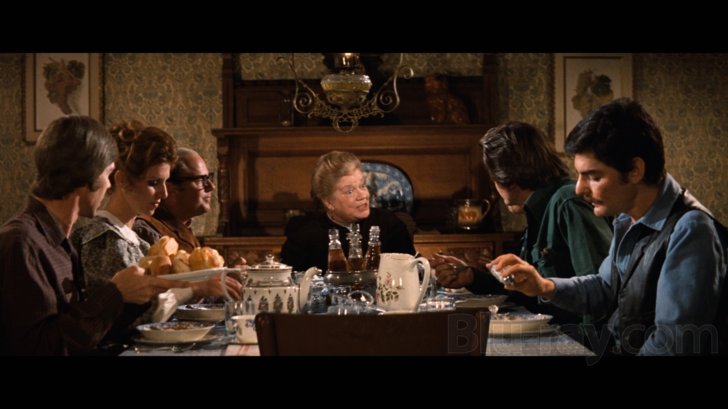
A small controversy has arisen regarding Warner's 1080p, AVC-encoded Blu-ray as a result of screencap comparisons posted by another site between the Warner disc and one issued last year in region B by Aventi, which is darker, has less intense colors and reflects different geometry that applies a slight squeeze to the image, cropping the top and bottom in the process (but adding a slight amount at the right edge). I don't have the Aventi Blu-ray, but I do have MGM's original DVD release of Westworld from 1998, which is now out of print. It reflects the same geometry shown on the Warner Blu-ray, but zooms the image slightly on all four sides, which was a common practice in the early days of DVD. (I have included two DVD screencaps, upscaled to 1080p, for comparison; they are at positions 6 and 28, immediately below their Blu-ray counterparts.) Having reviewed all three sets of images, and based on my own familiarity with the film, my conclusion is that the Warner Blu-ray reflects the accurate geometry and probably the most accurate framing. With respect to color and contrast, the issue is harder to resolve. I have never considered DVD presentations to be a reliable guide, and neither the director nor the DP is alive to tell us their intent. Having watched the Warner disc, I can affirm that it features excellent black levels, natural-looking grain and strong colors from a palette that seems appropriate to Crichton's effort to make the "Westworld" resort resemble a theme park derived from a movie. The transfer's only observable flaws are a lack of fine detail in long shots (which is probably a source-based issue) and a layer of video noise that is readily observable in a handful of shots but then disappears when each problematic shot concludes. (I have already read at least one complaint about so-called "DNR". If true "DNR" had been applied, there'd be no video noise to see.) In the absence of an authoritative sign-off, purchasers are free to choose the look that suits their taste—indeed, they're always free to make that choice (assuming, of course, that they have the hardware to play a disc locked for region B). I would simply point out that, according to the same site that posted the screenshot comparisons, Westworld runs almost four minutes shorter on the Aventi disc, for reasons that are nowhere explained. My own call is to go with the transfer where the technical crew appears to have gotten the basic geometry right. That's the Warner disc.
Westworld Blu-ray Movie, Audio Quality 
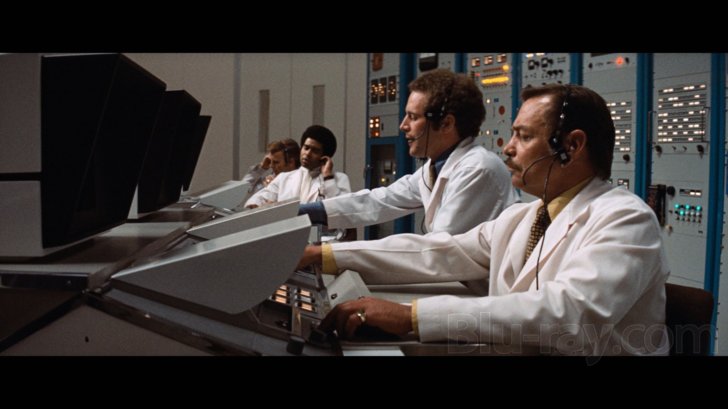
According to IMDb, Westworld was released in the four-track stereo process that was later supplanted by Dolby Surround. If Warner had access to the original elements, it would certainly account for the richness and dynamic range of the Blu-ray's DTS-HD MA 5.1 track, which is astonishingly good for a film of this vintage. The sound effects editing on Westworld is frequently subpar, especially when the action switches into slow motion, but the score by Fred Karlin (The Sterile Cuckoo) sounds superb, with a clear sense of stereo separation and a wide dynamic range with a solid bottom end. Although there is little in the way of noteworthy surround activity, the mono surround channel provides an expansive sense of presence for the score. The dialogue remains firmly anchored to the front and is always clear.
Westworld Blu-ray Movie, Special Features and Extras 
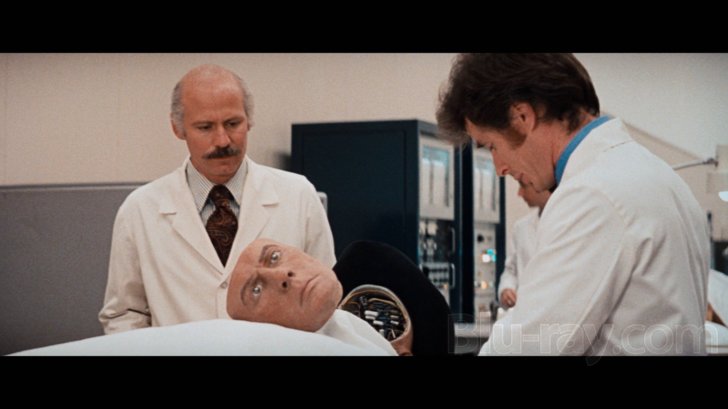
- Featurette (480i; 1.33:1; 9:07): This vintage EPK offers brief but informative interviews with Crichton, Brynner and Benjamin, as well as production footage and background on the film.
- Beyond Westworld: 1980 TV Pilot (480i; 1.33:1; 47:52): This is the pilot for the quickly abandoned series that CBS attempted to develop from the film. The series jettisoned the notion of technology run amuck and substituted a human villain named Quaid (James Wainwright), who had designed the robots but didn't like seeing them wasted on leisure activities. Quaid seized control of the entire robot population and had them destroy the theme parks. Now it's up to corporate troubleshooter John Moore (Jim McMullan) to stop whatever Quaid has planned, which seems to involve national security.
- Trailer (480i; 1.78:1, enhanced; 3:07): The trailer is memorable and was widely remarked on at the time because of the voiceover.
Westworld Blu-ray Movie, Overall Score and Recommendation 
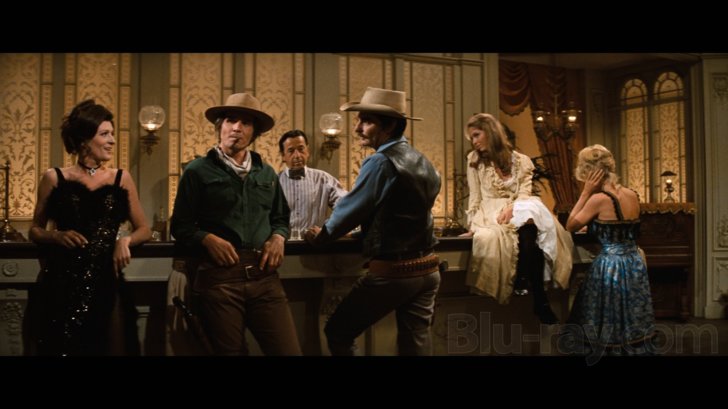
One aspect of Westworld that always left me dubious was the willingness of its guests to let themselves be observed by the park staff while engaging in the theme parks' elaborate charades, including sexual relations with robots in a variety of fantasy scenarios that most people presumably wouldn't want to share with strangers. This time around, though, I realized that Crichton's instincts were once again ahead of his time. If a theme park like Westworld existed today (and it still may be built, as least in the world of remakes), there would be an additional class of guest besides those paying the contemporary equivalent of $1000 a day. For these guests, all expenses would be paid in exchange for a waiver allowing their entire stay to be filmed and broadcast on a reality series. Crichton might not have imagined the specifics of Westworld: The Jersey Shore, but the germ of the idea is right there in his park design. Highly recommended.
Similar titles
Similar titles you might also like

Westworld: The Complete Series
2016-2022

Shoot the Sun Down
Director's Cut
1978

Big Jake
1971

Silverado 4K
40th Anniversary
1985

Chato's Land
2K Restoration
1972

Big Kill
2018

Outland 4K
Limited Edition
1981

Slow West
2015

The Quick and the Dead 4K
30th Anniversary
1995

The White Buffalo
2K Restoration
1977

Hang 'Em High
50th Anniversary Edition | Shout Select #57
1968

Pale Rider 4K
1985

El Dorado
1966

The Professionals
1966

Captain Apache
1971

Two Rode Together
Limited Edition to 3000 - SOLD OUT
1961

The Sons of Katie Elder
1965

Bite the Bullet
Limited Edition to 3000 - SOLD OUT
1975

The Train Robbers
1973

The Outsider
2019
